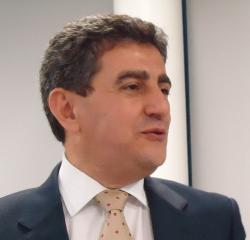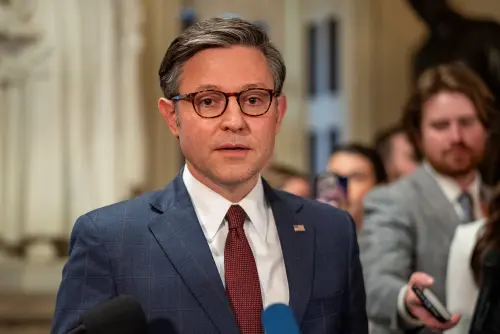

Past Event
Content from the Brookings Doha Center is now archived. In September 2021, after 14 years of impactful partnership, Brookings and the Brookings Doha Center announced that they were ending their affiliation. The Brookings Doha Center is now the Middle East Council on Global Affairs, a separate public policy institution based in Qatar.
The Brookings Doha Center (BDC) and Qatar University’s Gulf Studies Program jointly hosted a panel discussion on February 22, 2016, regarding the 2016 U.S. presidential elections and their impact on U.S. policy towards the Middle East. The panelists were John Hudak, a senior fellow in governance studies at the Brookings Institution and deputy director of the Center for Effective Public Management, and Abdullah Baabood, director of the Gulf Studies Program. The discussion was moderated by BDC director of research Sultan Barakat and attended by members of Qatar’s diplomatic, academic, and media communities.
Hudak opened with an overview of how the American presidential electoral system works, which he explains in his report. He noted that the presidential campaigns now last for almost two years and are extremely expensive. In 2012, the Obama and Romney campaigns spent more than $1 billion each, while, this year, combined spending is expected to top $5 billion. Both parties are having open competitions for their nominations. The Democrats quickly boiled down the competition to Hillary Clinton versus Bernie Sanders, while the Republicans, who began with 17 candidates—some with strong résumés and some with none whatsoever, still have five contenders, only three of which are strong: Donald Trump, Ted Cruz, and Marco Rubio.
Procedurally, Hudak continued, things did not start until February with the first caucuses and primaries in Iowa, New Hampshire, South Carolina, and Nevada. Candidates usually wrap up the nominations well ahead of the July conventions, but that is not the case this year, especially on the Republican side, where nobody is winning a majority. Even Trump, who is in the lead thus far, had not won 40% in any state yet. If no candidate has a majority before the party’s convention, the doors open up for selecting a nominee through negotiations and possibly backroom deals; while troubling, such a scenario could be good news for Republicans that dislike Trump. Overall, the Democrats entered the elections at an advantage, having done quite well in the prior two and the Republican campaign has not eroded that advantage thus far.
Turning to foreign policy, Hudak observed that some of the candidates have thoughtful, detailed proposals; the campaign could have been one of ideas. But that has not happened largely due to the media’s dereliction of its duties. He acknowledged that many around the world are waiting for more U.S. leadership in dealing with the Islamic State group. Yet, while many candidates agree that the Gulf countries should be more involved in contributing funding and troops, they otherwise differ on most other strategies. For instance, Cruz has called for carpet bombing the Middle East and a more robust American military presence, while Trump has said he would force Iraq to transfer $1.5 trillion in oil revenue to the United States and then carpet bomb Iraq’s oil fields. Others, such as Rubio and Kasich, want the United States to adopt a more supportive role, focusing on training and coordination; they also emphasize humanitarian concerns. During the Q&A, Hudak asserted that Syria would likely be the “number one on day one” foreign policy issue for the next president.
Regarding Syrian refugees, Hudak stated that both Clinton and Sanders have said the United States should accept some, while most Republican candidates have opposed accepting any and Trump called for preventing all Muslims from entering the country. Such inflammatory ideas have not come out of nowhere, but are present within American society; 75% of Republicans in South Carolina expressed support for banning Muslims, and Trump’s support has grown as his language has gotten more extreme. Nevertheless, some candidates have discussed post-conflict reconstruction in Syria, with the main difference being that Democrats were willing to spend American money on it, whereas Republicans staunchly opposed such government spending.
Hudak then recapped the results so far. He said Clinton’s victory in Nevada probably sets her up to win the nomination despite her numbers in Iowa and New Hampshire. If she does well, as polls predict, in the upcoming South Carolina primary and the twelve states that will vote on “Super Tuesday” on March 1, it would be very difficult for Sanders to win. On the Republican side, Trump is doing very well though he is probably reaching his peak. While many within the Republican establishment oppose him, it may be difficult for them to prevent him from winning and denying him the nomination at the convention may cause major turmoil.
Baabood began his comments by noting that the Middle East watches U.S. elections closely due to the United States’ status as a great power. Some countries, such as the Gulf states, would like to see a Republican in office due to historical relations, whereas Iran and others would probably prefer a Democrat. He noted that Gulf states are frustrated with Obama’s lack of clarity and interpret his Iran deal and reserved position on Syria as signs that the United States may be reducing its role as a regional security guarantor. Baabood asserted that the Gulf states are becoming more independent, citing the Yemen conflict and actions in Syria.
In response to Barakat’s question about the campaign’s lacking foreign policy discussion, Hudak explained that Americans are more concerned about issues that directly affect them, like the economy. The next president will have to think about the Middle East in a more dynamic way that transcends the “sound bite nature” of the campaign. Today, the candidates sound like “amateurs” in foreign policy as they do not seem to understand how events in one country can affect others. Overall, Clinton would provide the smoothest transition as world leaders already know what to expect from her, whereas Trump would be a great unknown.
Barakat asked whether Clinton’s gender played a role in her campaign. Hudak posited that the few Americans that would not vote for a female candidate probably are not Democrats, so gender bias has not held Clinton back, but on the Republican side Carly Fiorina faced significant resistance. Similarly, American Muslims face real challenges as clear biases against them cut across party lines, hindering their ability to make waves in elections the way other minorities have been able to do. Baabood added that a disconnect exists between Muslims and Arab Americans and their Middle Eastern counterparts and that the region’s conflicts can sometimes complicate relationships within American communities.
During the Q&A, an audience member argued that the campaign is in a rhetoric phase, which is separate from governance, and that Trump is specifically going after the “neoconservative” establishment and the Clintons and has been the only candidate to turn away the Jewish lobby. In response, Hudak noted that some candidates have sought to go beyond rhetoric. Rubio could be considered a “neocon” while Cruz the constitutional conservative. Trump is just appealing to people that are extraordinarily mad, but he is uniquely positioned to put forward new policies due to his wealth and political independence.
In response to a final question, Hudak said that Trump’s success despite his lack of political experience, numerous gaffes, and brashness “throws a lot of what we know out the window,” but also “makes perfect sense.” He is demonstrating shrewd politics by emphasizing the right issues to the right people and finding the issues that matter most to the most people.



Constanze Stelzenmüller, Fred Dews
May 3, 2024

Melanie W. Sisson
May 1, 2024

Sarah A. Binder
April 30, 2024